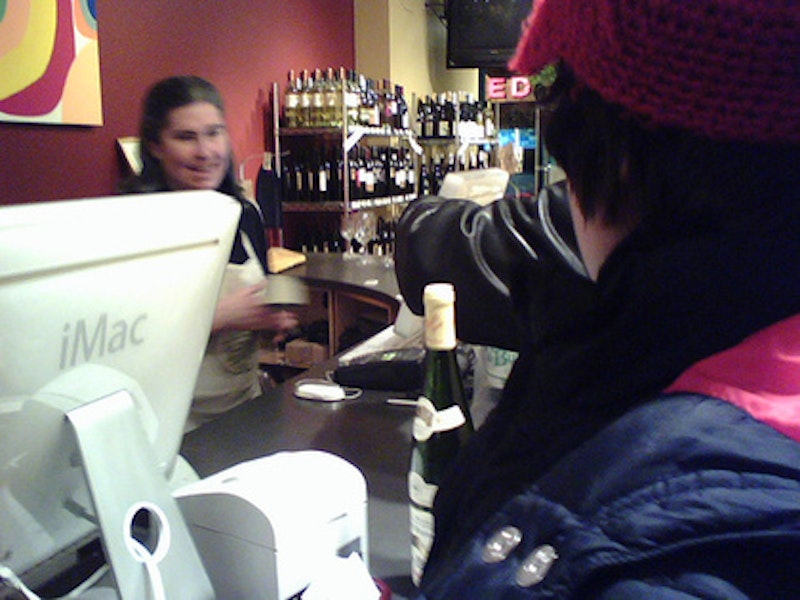It had been awhile since my adventures in retail, but recently I started working as a cashier in a nationwide big box store for some extra scratch. There is an underrated moral struggle that is placed before your average cashier at one of these nationwide chains. It does not occur in every chain and is usually absent from mom-and-pop local shops, but it is more widespread than you would think once you start noticing it. It is the decision to sell.
You see, at the Mobil, my job was relatively simple: take people’s money, put up with their grumbling about cigarette/soda/gasoline prices, be nice, don’t steal, take out the trash. At the new digs, the formula is a bit more complex in that it is also my job to let you, the almighty customer, know about the promotions, frequent shopper cards, donation drives, and other various selling points that are open to you. Each customer will be on the receiving end of no fewer than three offers and three questions over the course of a minute-long transaction. Some of these involve a ton of words garbled as quickly as possible as I have to explain the donation drive, the promotions, or the frequent shopper card.
Now, imagine throwing all this at a customer who either scowls at you like you are trying to nab their purse or looks down their nose at you as if you have no right to even address them because they are the CUSTOMER and you are serving at their pleasure. They’ve already made it very clear to you that they have ABSOLUTELY NO NEED for a frequent shopper card and do not feel like donating today. They start tapping their foot and waving their credit card at you. And here’s the dilemma: despite everything about this interaction pushing you to back off, do you ignore your best social and shame instincts and tell them about the gift that’s available to them, as well?
Taking money wordlessly is easy. Maybe a quick hello or thank you is all you need. You are not encroaching on the customer’s time, inserting yourself into a stranger’s thoughts and plans when all they wanted was a newspaper. It would be easy to take the first no at face value, be a mediocre employee—especially considering you’re probably not there to start a career—and save a little social grace and avoid a lot of awkward discomfort by avoiding the rest of the questions. Or, you can do what I did and rationalize the whole thing to yourself by saying “Well, they wouldn’t have known about the discounts or the donation drive if I hadn’t said anything, so who cares if I bother a few people.”
So, if you come to my register, I am going to try to guilt you into donating to those poor sick little bastards that are going to be stuck in the hospital over the holidays and do you have any children/nieces/nephews/grandchildren that have ever been stuck there, oh I know, isn’t it awful? And that damnedest thing is that people usually don’t really need to be convinced. Despite tough economic times—and after all, I am in Michigan near Detroit, one of the places hardest hit by just about every problem facing our country right now—a huge number of people willingly/begrudgingly donate to the cause. This makes me feel good about Americans and, honestly, humans, in general.
But I’ve noticed a trend that I don’t understand when it comes to people’s reaction to being asked if they want to donate. The most common way that someone responds to my query is neither yes nor no, but is some variation of “We do other things.” The identity of this “We” is never quite clear and customers almost always say “We” even if only a single person is present. This answer puzzles me. I understand that giving to the community isn’t a purely selfless activity, but I find it odd that people feel the need to justify their commitment to charity to me, who they obviously view as a stranger. I know they view me as a stranger because, frustratingly, I’ve found these people are usually the most likely to yell, whine, condescend, try to weasel a discount and generally treat cashiers like dirt.
When these “We do other things” folks look for my approval, I usually give it and mean it. But just because you donated a few books to your kid’s second grade class or donated a new multi-million dollar wing to the hospital doesn’t give you the right to be a dick to strangers. Charity is a good thing but it doesn’t make you inherently good. Someone who a mere five seconds earlier was screaming at me over not getting some discount cannot preach to me about giving or question my honesty about where the gifts are actually going as if my being a stranger forces me to lie to them and steal their donations. I don’t get it: in one breath, they are extolling the bounty of their kindness toward strangers, and in the next, they’re treating one like he doesn’t exist. Cashiers are people, too, damn it, even if we are strangers.
Strangers are People Too
Be nice to strangers, even if you're not programmed to be.

Photo by The Consumerist.
